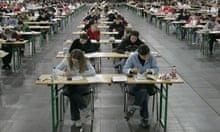Hoping your big sister will help you out with your latest assignment? If you're studying online with Coursera, you'd better not let her do the typing. Special software that recognises students' typing speeds and rhythms is used to verify identity, preventing somebody else from taking an assessment on their behalf.
If students want a verified certificate for their online course, they can pay a fee of $30-90 (approximately £17-54) for the Signature Track service. They will be asked to submit a webcam photo and identification card to check their identity.
Cheating isn't a new problem for universities, but the growth in online courses – particularly massive open online courses (Moocs) – has forced academics to search for new ways to ensure honesty and protect academic integrity.
The causes of plagiarism are the same, regardless of where or how students are learning. Stress, tiredness and pressure to perform are all common factors.
And while there isn't any data to suggest whether students are more or less likely to commit plagiarism when learning online, Jisc, which specialises in digital education, says a large online cohort size and distance learning – where students aren't based on campus – can make foul play harder to spot.
Michael Dunn, a senior lecturer at the University of Derby and expert in electronic plagiarism, says that before seeking to identify why students cheat, universities should ask if students know what constitutes cheating in an academic context.
A report by the Office of the Independent Adjudicator, which deals with student complaints, found a steep rise in complaints from UK students about harsh treatment by their universities over cheating.
On courses designed for a global online audience, providers should also ensure they respond to different cultural attitudes, says Dunn, adding: "In some cultures, repeating the thoughts of another author is considered a form of flattery."
The majority of traditional, accredited courses educate new students about cheating and plagiarism. Introductory lectures, sessions with support staff, and institution guidelines make clear what academic dishonesty is and how to avoid it.
Coursera has begun asking students on its free courses to sign an honour code at the beginning of their programme, where they pledge not to cheat. It's a tradition in many American universities but was replicated by Coursera after instances of plagiarism emerged.
On campus-based or online courses where a degree can be earned, violation of the institution's code of conduct can result in a mark of zero, suspension, or permanent exclusion from the university. But if no academic credit is attached, the consequences of dishonesty are not as clear.
Free courses are usually designed to benefit only the student's education, with no accreditation that could boost employment opportunities or open routes to further education. Coursera, for example, does not look to replace university education but aims to provide "an alternative to no higher education."
FutureLearn from the Open University has a similar approach. Its learning technologist David Major says courses are focused on "encouraging people to learn for their own benefit, not to produce a piece of paper to impress someone else". It's for this reason that they have a less robust approach to tackling dishonesty.
While the resources and opportunities to learn for free are widely available, the means for ensuring honesty and academic integrity are largely confined to courses with explicit academic value – and a price tag.










Comments (…)
Sign in or create your Guardian account to join the discussion